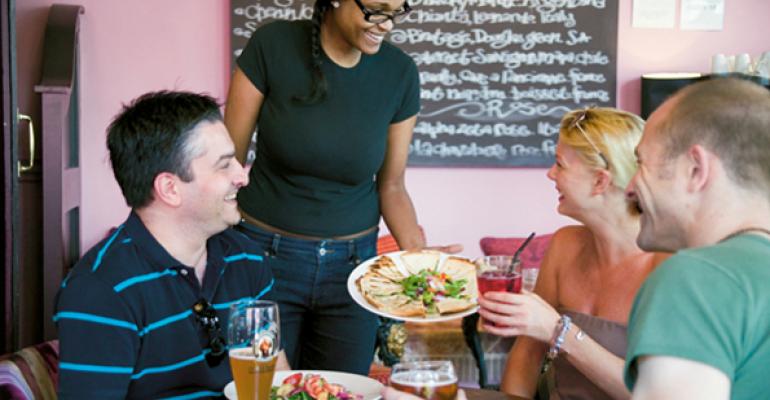 Restaurant visits are stalled at 2013 levels.
Restaurant visits are stalled at 2013 levels.
Restaurant operators are still waiting for traffic to rebound, but at the moment year it remains at prerecession pace, according to the NPD Group. Through the year ending May 31, U.S. consumers made about 61 billion visits to restaurants, down nearly 1.3 billion and flat compared to a year earlier.
NPD points to a number of challenges to growth: Visits to midscale/family dining and casual restaurants have been slipping since before the recession; lunch and dinner meal times have seen traffic declines for the past several years; 25- to 49-year-olds are eating out less and quick-service burger chains are losing customers.
“There are some fundamental shifts in how consumers, particularly low and middle-income consumers, address their discretionary spending,” says NPD’s Bonnie Riggs. “Going to a restaurant is a nice-to-have and not a need-to-have.”
On the plus side, NPD says, value-oriented meals are doing well. Breakfast traffic has been up the last three years, and discount/deal promotions are finder more takers.
 Chipotle fans apparently shrugged off recent price hikes, and the chain wants to speed up production.
Chipotle fans apparently shrugged off recent price hikes, and the chain wants to speed up production.
Chipotle beat earnings expectations, posting a 28.6-percent rise in quartly revenue and opening 45 new stores in the last quarter.
Based on that performance, Chipotle customers apparently weren’t fazed by recent price hikes. Levied to office rising food costs, they ranged from 6.25 to 6.5 percent, with steak prices rising by about 9 percent and chicken prices up about 5 percent.
And Chipotle thinks it can do better, at least in the efficiency department. To meet demand during peak hours, the company is working on ways to speed up production.
During the last quarter the chain was able to complete about 110-120 transactions per hour. The process depends on four “key pillars” of throughput: having a worker dedicated to restocking and problem-solving, proper ingredient preparation, putting the best people at their best stations; and having a dedicated expediter at peak times.
 John Tesar lashed out at a critic after a subpar review of his new Dallas restaurant.
John Tesar lashed out at a critic after a subpar review of his new Dallas restaurant.
The chef, clearly incensed over a three (out of five) star review of his new restaurant, Knife, tweeted this love note to Dallas Morning News critic Leslie Brenner: “Fuck you! Your reviews are misleading poorly written, self serving and you have destroyed the star system and you really suck.” PS: He banned the critic from visiting his eateries in the future.
Brenner was underwhelmed with a bacon tasting, suggested “the kitchen too often drops the ball” and criticized the menu for its breadth and apparent lack of thought. Ouch!
This isn’t the first time the scrappy chef has had a public spat. A D Magazine article branded him “The most hated chef in Dallas” and recounted tales of his skirmishes, knife throwing and more.
 Another prominent chef tackled the tipping dilemma, calling it “a devil’s bargain.”
Another prominent chef tackled the tipping dilemma, calling it “a devil’s bargain.”
In a thought-provoking, well-reasoned essay on Eater.com, Amanda Cohen, chef/owner of NYC’s Dirt Candy restaurant, argued that it’s time to dump the tips-for-service system in restaurants.
“It makes no sense. At the end of the meal, just when people are very drunk, or very full, or very ready for romance, we ask them to do math. And not just any math, but a word problem involving percentages. It’s a lame way to end a meal,” she writes.
She also points out how tipping unfairly tips the pay scale too far toward servers and away from everyone else who works in a restaurant. “Tipping hurts restaurants by turning your staff into separate and not always equal factions,” Cohen argues.
 An Indiana city will pay someone $250,000 to open a new restaurant.
An Indiana city will pay someone $250,000 to open a new restaurant.
The Southwest Indiana Chamber has dreamed up a novel economic development contest designed to stimulate growth in downtown Evansville: the Main Course Restaurant Challenge wants restaurant operators and other entrepreneurs to build a new eatery, and the winning idea will receive a privately funded prize package valued at more than $250,000.
To qualify, the restaurant will need to serve lunch and dinner and incorporate a bar. It must be open no later than Sept. 1, 2015 inside a now-vacant building that was once a jewelry store.
The prize includes cash and in-kind contributions from a variety of companies and organizations. Entries, which will be evaluated on overall creative concept, grasp of the local market and portfolio of past successes, must be submitted by Oct. 15.





